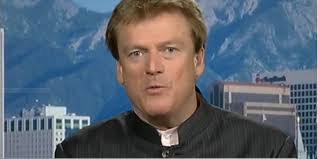There was an article in The New York Times yesterday about the SEC’s disgraceful ruling that it will take no disciplinary action against the SEC cronies at the center of the Gary Aguirre scandal. Read through the Times’ false veneer of objectivity, and it seems that reporter Walt Bogdanich is trying to say that it’s pretty damn strange that a corrupt SEC has been allowed to adjudicate its own corruption.
Stranger still, no other journalist has expressed outrage over this. Meanwhile, the nation’s mainstream media (The New York Times included) has yet to deliver a story describing the Aguirre scandal’s most important component – the bit that makes it the greatest scandal in the history of the SEC and which helps explain why the commission failed to stop a crime that later contributed to the near total collapse of the American financial system.
Readers of the mainstream media know only that Aguirre is the former SEC attorney who claimed that he was fired for political reasons after pursuing an “insider trading” case against Morgan Stanley CEO John Mack and a hedge fund called Pequot Capital. The real story – the one you don’t read in the papers – is that Aguirre has, all along, made it perfectly clear that his investigation – the one he says that Mack “stopped in its tracks” – was about much more than the relatively minor crime of “insider trading.”
Aguirre blew this scandal wide open in 2006, when he wrote an 18-page letter to the U.S. Congress. The letter reads: “I believe our capital markets face a growing risk from lightly or unregulated hedge funds just as our markets did in the 1920s from unregulated pools of money — then called syndicates, trusts or pools. Those unregulated pools were instrumental in delivering the 1929 Crash….There is growing evidence that today’s pools—hedge funds—have advanced and refined the practice of manipulating and cheating other market participants.”
Aguirre then described the investigation that he had led at the SEC. “The investigation was two-pronged,” he wrote. One prong concerned “insider trading.” However, the second, and far more important prong, concerned “market manipulation.” Specifically, Aguirre and his colleagues were investigating “two suspected violations: wash sales and naked shorts.”
“My colleagues,” Aguirre wrote, “believed [the naked short selling] held a greater potential to severely injure the financial markets.”
That is, Aguirre and his colleagues believed that naked short selling (hedge funds selling stock that they have not yet purchased or borrowed in order to drive down prices and destroy public companies) ranked high among the tactics that “were instrumental in delivering the 1929 Crash” – a repeat of which now seemed entirely possible since the tactic had been “refined” by hedge funds intent on “manipulating and cheating other market participants.” But the SEC rank-and-file’s attempt to investigate this crime was “stopped in its tracks” by SEC leaders who had been corrupted by Wall Street fat cats.
At the time when Aguirre released his letter, a small clique of influential journalists with close ties to certain Wall Street fat cats were going to great lengths to whitewash the crime of naked short selling (see “The Story of Deep Capture” for details). Unsurprisingly, some of these journalists quickly sought to discredit the SEC whistleblower. They reported that Aguirre’s investigation concerned only the minor infraction of insider trading, and that he had failed to present evidence that this minor infraction had occurred. The journalists also declared that Aguirre was untrustworthy – an eccentric who had been fired for poor performance.
After a year long investigation into the matter, however, the Senate Judiciary Committee completely vindicated Aguirre. It noted that Aguirre had been fired just two weeks after his supervisors had raved about his “unmatched dedication” in glowing written evaluations of his performance. It presented clear evidence that Mack’s lawyers were given special access to meetings in which Aguirre’s investigation was discussed. While the SEC was busy quashing the investigation and firing Aguirre for complaining about it, Paul Berger, then the SEC associate director of enforcement, was interviewing for a job at Mack’s law firm.
The Senate investigators concluded that they were “deeply troubled” by the SEC’s failure to look into Aguirre’s claims. “At worst,” the Senate report said, “the picture is colored with overtones of a possible cover-up.”
As part of this cover-up, the SEC eventually claimed that although Aguirre had been fired, the commission had nonetheless pressed forward with its “insider trading” investigation, finding no evidence that Pequot or Mack and committed any violations. However, the SEC has yet to reveal whether its rank-and-file were allowed to complete their investigation into the naked short selling that had the greater potential to “seriously injure the financial markets.”
SEC leaders remained uninterested in the crime until this past summer. Data for June showed that “failures to deliver” (phantom stock sold by naked short sellers) had peaked at more than 2 billion shares – an all time record. More important, the SEC’s cronies on Wall Street were now victims of the very crime that they had perpetrated and covered up. An avalanche of naked short selling, timed to coincide with a false news report on CNBC, had sparked the run on the bank that took down Bear Stearns. Now, other Wall Street institutions (including, yes, Morgan Stanley) were getting similarly clobbered. In mid-July, the SEC pronounced that naked short selling had the potential to “seriously damage” the financial system. It issued an “emergency order” protecting 19 big financial institutions (including Morgan Stanley) from the crime.
That kept the big banks safe for a time. But ultimately, short-sellers proved to be more skilled at cronyism than their former accomplices at the big banks. In August, under pressure from the short seller lobby, the SEC lifted its “emergency order.” In the next three weeks, a half-dozen major financial institutions were eliminated or nationalized. Morgan Stanley CEO John Mack (no doubt regretting that he had quashed the Aguirre investigation) hollered that he was next — that law-breaking short sellers were taking down his bank. The SEC responded by banning short selling outright in 900-plus companies. Meanwhile, everyone from Hillary Clinton to John McCain implicated naked short selling in the biggest financial cataclysm since 1929.
A few weeks later the SEC inspector general issued a 191-page report vindicating Gary Aguirre. The otherwise detailed report conspicuously failed to mention the naked short selling component of Aguirre’s investigation, but it contained many of the same findings that the Senate had described. The report, compiled over many months, concluded that Mack’s interference with Aguirre’s investigation raised “serious questions about the impartiality and fairness” of the SEC. The inspector general recommended that disciplinary action be taken against Aguirre’s supervisors, including SEC Director of Enforcement Linda Thomsen.
But last Friday, having spent no more than a few days reviewing the evidence, an SEC administrative judge declared that the SEC did not mishandle the Aguirre case, and that no disciplinary action would be taken. As Bogdanich’s story in The New York Times makes clear (though in not so many words), the ruling stinks to high hell.
For one, it remains unclear why in the world an SEC judge, as opposed to an independent court, is ruling on this matter. For another, it seems that the judge, Brenda Murray, was not even acting in the capacity of a judge. Rather, she issued her not-guilty verdict in the capacity of “an individual” who was asked by the SEC executive director to evaluate the inspector general’s findings.
In other words, there is good evidence that the leaders of our nation’s market regulator are as corrupt as Banana Republic cops on the brothel beat – that they have engaged in a cover-up that might have helped rock the very foundations of the American financial system – but this evidence will be evaluated in no court. There will be no legal proceeding whatsoever. Instead, an “individual” at the SEC, as a favor to the SEC executive director, says the SEC did no wrong…and that’s it – end of story.
Really, end of story. Because, aside from Walt Bogdanich at The New York Times (a paper that won’t call an “outrage” by its proper name, and which seems incapable of printing the words “naked short selling”), no mainstream journalist seems to give a flying hoot.
* * * * * * * *
Contact Mark Mitchell at [email protected]








Thank you for keeping us informed on the continued SEC corruption.
This article is now being featured at MarketRap.com
The site was actually created for this community. I would really like to see some of you register and help us moderate our Oversight pages, where we tell the truth about the shadow figures of Wall Street. We believe these pages will eventually be very popular. Please check it out.
Also, don’t forget to vote on the deepcapture.com contest which ends in a few days. There are some great entries, including mine!
The only way we can bring the scum to justice is to band together as investors and citizen reporters as we are doing here and continue to move forward in making the truth known.
Mark, the members of the House committee on oversight and government reform is holding a hearing tomorrow, Thursday, Nov. 13, to question hedge fund managers about whether their operations create special risks to the financial sector and the economy. I think you should provide your commentary to members of the committee. Perhaps it will give rise to inquiries that are better informed, and maybe even more persistent than the “show trials” they often turn out to be. Here is the link to the committee site: http://oversight.house.gov/
Thanks for your efforts.
Thanks for the heads up, I will record the hearings. I suspect it is not just coincidental that the SEC report, clearing the SEC, appeared 2 days before the congressional hearings. Just in time to perhaps deflect deep inquiry into the stinking story.
I was lucky to come across this but I am glad I did. This has been going on a lot longer then just a few months.
I have been following a group at http://www.LeMetropoleCafe.com that has been bang on with their market commentary for the past 8 years.
They even took out a full page color add in Jan 08 in WSJ to warn people what was coming. And no one listened. They nailed it and talked about all the corruption. Especially about the PPT(Plunge Protection Team).
Anyway keep up the great work. We need more sites like this to inform the citizens.
P.S. Why has the price of gold and silver gone down during this crisis. Yet if you want to buy the actual physical product you will be paying a 50% premium over the spot price. That is if you can find any. Interesting.
You would think that the SEC and the current Administration want this crash to occur. Maybe they are covering at lower prices???
We live in the greatest country in the world
but Australia can fix the problem first amazing
CANBERRA: Australia moved Thursday to put a permanent ban on the most controversial form of short-selling and imposed tough new disclosure rules, in a crackdown on hedge funds aimed at restoring confidence in markets.
“Australia will be banning ‘naked’ short-selling,” the corporate law minister, Nick Sherry, said, referring to a practice whereby investors sell shares they neither own nor have borrowed in the hope of quickly buying them back at a lower price and pocketing the difference.
Naked short-selling is considered murkier and more risky than traditional short-selling, in which investors sell borrowed stock. The ban is in line with similar moves made recently in the United States and several European countries.
Australian regulators banned covered and naked short-selling in September in an immediate response to the global market meltdown. But they left it to the government to make long-term rulings.
On Thursday, the government confirmed some of the worst fears of the hedge fund industry, mandating a strict new disclosure regime that could compromise the trading strategies of short-sellers. Beginning Wednesday, the new rules would require short-sellers to declare their positions immediately to their brokers, who would in turn notify the stock exchange before trade opened the next morning.
Today in Business with Reuters
OECD forecasts major slowdown for industrialized countriesU.S. Treasury shifts focus of credit bailoutIn London, the City goes into reverseA daily report on short sales by security and volume, including covered short sales in financial securities, would then be made to the market before trade opened the following day.
The current ban on covered short-selling is due to be lifted in two stages, for nonfinancial stocks on Wednesday and for financial stocks not before Jan. 27.
Sherry said he expected the new laws, which the government wants passed by Parliament by mid-December, to also increase supervision of credit ratings agencies, and to require them to become licensed as financial services providers and report annually to the Australian Securities and Investment Commission.
“It is very important for retail and wholesale investors in Australia that we have robust ratings, and robust research of financial products,” Sherry said.
The Australian stock market has fallen by about 41 percent this year and is trading near a four-year low.
http://www.iht.com/articles/2008/11/13/business/short.php
——————————————————————————–
RTC_TARP_TARPv2
Evidently The Hill got an up close an personal look at some ‘real’ mark to market FUBAR toxic investments and RAN!!!!!!!!!
Banks owning this shite are going to be forced to WRITE DOWN MORE VALUE ____$$$$$$$$.
The black hole that was AIG makes ENRON and WCOM look small .
King Hedge Funds talk systemic risk talk with with DC, Soros wax poetic about bubbles and silly overcooked and undercooked SEC regs.
Threats that the securitizations of Credit Card debt is next. Well everyone knows by now that DEBT SECURITIZATION+SCAM RATING AGENCY RATING+LEVERAGE means these shitey bonds are next up.
More CDS insurance bets, more plays on the equity and so it goes.
All Fiat.
Paulson ain’t getting NO MEDALS for TARP or (2) or #X.
Goldman Treasury Class of 08 _FEH!
http://news.google.com/news?sourceid=navclient&ie=UTF-8&rlz=1T4ADBR_enUS261US261&q=Is%20Paulson%20Confused&um=1&sa=N&tab=wn
I wish I could add something substantive to the discussion besides a string of profanity. Keep up the good work, and someday these filthy scum will see justice, be it bankruptcy of GS, or some regulations with teeth (that are actually followed). Now tell me why a crooked hack from Cook County Illinois is a president that will change anything?? Regards, CJD
The more I read and understand the counterfeiting hedge fund tactics, the more it appears that those in Congress who setup the hedge fund industry as UNRegulated understood that this was a “Quid Pro Quo” arrangement between the congressional political parties and the hedge funds.
Some months ago, I heard that it was estimated that the presidential campaigns would cost about 3 Billion dollars. I saw a figure the other day that estimated that 5.4 Billion dollars in total were spent on all political elections nationwide held on Nov. 4th.
With such extraordinary amounts of money needed by the political parties, it appears Congress gave their financial political backers a way to make “easy money.” Making hedge funds UNRegulated was simply an extension of what Congress always does for itself – exclude itself from the laws it passes. Since Congress is not bound by the laws it passes, it made sense to exclude its financial backers from security laws, especially since their financial backers where expected to put some of their “easy money” back into the political process to support Congress.
Was it a coincidence that the UpTick rule was eliminated about the time the presidential races were taking off?
Did not the elimination of the uptick rule allow Congress’ financial backers to make even more “easy money”? To more easily Support the extraordinary need for more money in these political races?
And is it a coincidence that Mr. Cox is a political insider who just happens to understand the “Quid Pro Quo” arrangement made by Congress with its financial backers who are invested in hedge funds.
Was it a coincidence that the hedge funds managers testifying in Congress this week did not receive a grilling from Congress men and woman?
It appears to me that the political parties have purposefully setup UNRegulated hedge funds with the full knowledge this is a “Quid Pro Quo” arrangement. Congress gives their financial backers a way to make “easy money” by allowing hedge funds to counterfeit stock shares, and their financial backers graciously support the political parties with monetary donations.
As long as Congress feels “warm and fuzzy” about its “Quid Pro Quo” arrangement with UNRegulaged hedge funds, I think the SEC will continue to respond to public outcry with band-aid fixes instead of concrete solutions.
One possible solution is to expose this “Quid Pro Quo” arrangement Congress has with UNRegulaged hedge funds. But it is not clear HOW we can do this, since everything is a secret.
I would call your attention to a blog where a Naked Short Criminal has gone to roost. Do you know who he is? He’s working LA and he’s worked it slow.
He’s now at
http://street-hassle.blogspot.com and its scary to watch. He posts as Don Quixote but who is he? You decide
When “I told you so” just is’nt enough!!! You think they will ever apologize to Patrick and you other guys?
Goldman Targeted by Investor Complaints of Naked Short-Selling
By Pierre Paulden and Caroline Salas
Nov. 17 (Bloomberg) — Investors in the $591 billion high- yield, high-risk loan market are accusing Goldman Sachs Group Inc. of naked short selling to profit from record price declines.
At least two fund managers complained verbally to officials of the Loan Syndications and Trading Association, saying they believe Goldman helped drive down prices by using the technique, according to people with knowledge of the objections. New York- based Goldman is acting against its clients by trying to profit at their expense, the investors said.
A $171 billion drop in the value of the loans in the past year is pitting banks against investing clients on assets once considered so safe they typically traded at par. The drop exposed flaws in an unregulated market where trades can take from several days to months to settle and banks may have information unavailable to investors. In a naked-short transaction, a firm would sell debt it didn’t already own, betting the price will fall before it purchases the loan and delivers it to the buyer.
“The LSTA is closely monitoring issues of naked short selling,” Alicia Sansone, head of communications, marketing and education at the New York-based industry association, said in an e-mail.
The group, comprising banks and money management firms that trade the debt, plans to tighten rules to ensure transactions are settled more quickly and prices reported accurately, Sansone said. She wouldn’t elaborate or discuss the claims against Goldman.
‘Different Causes’
“Increased volatility in the secondary market has been broadly documented and loan portfolio managers have suffered negative returns since July 2007,” Michael DuVally, a spokesman for Goldman, said in a statement.
“Investors are understandably focused on the many different causes of this volatility, but Goldman Sachs’ trading positions should not be one of them,” he said, declining to comment on whether the firm was short-selling loans.
Goldman rose to the fourth-largest U.S. originator of leveraged loans last year from eighth in 2005, according to data compiled by Bloomberg. The firm helped arrange financing for First Data’s purchase by Kohlberg Kravis Roberts & Co. as well as the $32 billion acquisition of First Energy Holdings Corp., formerly known as TXU Corp. by KKR and TPG Inc.
Most Aggressive
The bank was seen as the most aggressive in recent months in selling loans at prices below other dealers’ offers and taking longer than the LSTA’s recommended seven days to settle the deals, according to the investors complaining to the trade group.
There’s no rule preventing naked short selling of loans. The U.S. Securities and Exchange Commission this year banned the practice for 19 stocks including Lehman Brothers Holdings Inc. and Fannie Mae and Freddie Mac from July 21 to Aug. 12 as share prices plunged. New York-based Lehman, once the fourth-biggest securities firm, eventually went bankrupt and Fannie and Freddie, the two largest mortgage-finance providers, were brought under government conservatorship.
The slump in loan prices during the global seizure in credit markets is causing particular disruption in the loan market because the debt typically trades close to 100 cents on the dollar. Prices never were below 90 cents until February this year. By October they had fallen to a record low of 71 cents, according to data compiled by Standard & Poor’s. The decline, which S&P said equated to losses of about $171 billion, helped drive the complaints from fund managers.
‘Shell-Shocked’
“Investors are shell-shocked” by the decline, said Christopher Garman, chief executive officer of debt-research firm Garman Research LLC in Orinda, California. “In many ways they’re all but wiped out.”
Because prices were so stable, short sales of loans were unheard of until now, Elliot Ganz, general counsel of the LSTA, said at the group’s annual conference in New York last month.
“No one ever shorted loans,” Ganz said. “Prices never went down.”
High-yield, or leveraged, loans are given to companies with below-investment grade ratings, or less than Baa3 at Moody’s Investors Service and under BBB- at S&P. Banks typically form a group to arrange the financing. They then find other investors to take pieces of the debt, helping spread the risk.
Those loan parts can trade through private negotiations between banks and hedge funds or mutual funds. One of the lenders involved in the initial deal remains the so-called agent bank, which keeps track of who owns what piece. Unlike bonds and stocks, the debt doesn’t trade on an exchange and has no central clearinghouse.
Agent Banks
When a loan changes hands, the agent bank must sign off on the transaction, meaning it knows exactly who is buying and who is selling. The rest of the market is in the dark. Getting an agent to sign off, also can delay settlement.
“An agent will have a bird’s-eye view of who owns what and when,” said John Jay, a senior analyst at Aite Group LLC, a research firm that specializes in technology and regulatory issues in Boston. “They have information that no one else has.”
Conflicts within the syndicated loan market have escalated since the credit crisis began. Banks, stuck with more than $230 billion of loans they’d promised to fund leveraged buyouts, tried to renege on some agreements and others broke ranks with the typical banking syndicate.
Bain Capital LLC and Thomas H. Lee Partners LP, the Boston- based buyout firms that bought Clear Channel Communications Inc. sued banks including Citigroup Inc. and Deutsche Bank AG, in March accusing them of refusing to fund the acquisition. The banks counter-sued, claiming they were acting in good faith. The parties reached a settlement in May allowing the purchase to proceed at a lower price.
Tensions Increase
Tensions have also increased between investors that buy debt from banks. As banks ratcheted back credit and loan prices fell, fund managers that use borrowed money to buy loans have been forced to offload assets, further eroding prices and sparking more waves of selling.
Black Diamond Capital Management LLC, a Connecticut-based manager, filed a lawsuit last month against Barclays Plc, the U.K.’s second-largest bank, over derivative agreements tied to leveraged loans. Black Diamond is demanding the lender return $302 million.
The lawsuit is “without merit” and Barclays will fight it, Brandon Ashcraft, a spokesman for the bank in New York, said in an e-mailed statement.
Loans aren’t securities and are not governed by laws covering trading in bonds and stocks. While LSTA standards say a loan should settle within seven days of the trade, there’s no law governing the timing.
The average trade of a loan to a company not classified as distressed took 19 days to settle in the second quarter, according to LSTA data.
Three Days
In the bond market, the standard settlement time is three days following the trade. In a bond short sale, a trader acquires debt by borrowing the security in a deal known as a repurchase contract. The two sides specify how long the bond will be borrowed with the right to renew the pact. Because loans can’t be borrowed through such agreements, any short seller would have to go naked.
While the LSTA doesn’t track the amount of loans currently unsettled, at least 700 trades made by Lehman Brothers Holdings Inc. before it filed for bankruptcy hadn’t cleared, Ganz told last month’s conference.
Emergency Meeting
The strains over settlement prompted LSTA president Bram Smith to call an emergency board meeting on Oct. 20, people with knowledge of the session say. The complaints of Goldman’s trading methods were also discussed, said the people, who declined to be named because the talks were private.
Among those on the call was Lisa Opoku Busumbru, chief operating officer for loan trading at Goldman and a board member of the LSTA. Opoku Busumbru denied on the call that New York- based Goldman was short-selling loans, the people said.
Trading in the market is so opaque that it would be impossible to tell if a firm was short-selling, Jay Katz, managing director of Storm Networks LLC, a New York-based technology company launched in October with backing from Bank of America Corp. Credit Suisse Group AG and Morgan Stanley that helps settle loan trades within three days. A trade could be delayed for many reasons including not owning the debt, he said.
Heightened Concerns
While the delay in settlement had been an administrative issue for years, the tumbling loan prices and heightened concerns about creditworthiness of borrowers, banks and hedge funds have made it pernicious, said Ian Sandler, an executive director at Morgan Stanley and a board member of the LSTA.
A buyer or seller, or even the borrowing company, could go bankrupt in the time it takes for the loan to change hands, causing losses for the firm on the other side of the trade, Sandler said.
“Delayed settlement is a real concern because you have to worry about the loan deteriorating and the failure of the counterparty until the trade is completed,” said Sandler. He wouldn’t discuss the claims against Goldman or the emergency board meeting. “There is a tremendous amount of open trades currently in the loan market.”
Goldman has previously butted heads with investors, who are also clients through borrowing or advisory agreements.
In the early 1990s, the firm created the $783 million Water Street Corporate Recovery Fund to buy controlling stakes in the debt of financially distressed businesses. It was shut a year later when its negotiations upset clients such as Fidelity Investments and Tonka Toys.
While other banks are reining in capital, Goldman raised $10.5 billion last month for a fund run by Thomas Connolly in New York to make loans to high-yield companies.
The firm may write down its leveraged-loan portfolio by $1.3 billion in the quarter, Guy Moszkowski, an analyst at Merrill Lynch & Co., estimated last week.
To contact the reporters on this story: Pierre Paulden in New York at [email protected]; Caroline Salas in New York at [email protected]
Last Updated: November 17, 2008 00:01 EST
What goes around… well you know the rest!!LOL!! It is rumoured that he just ask that the Federal Reserve be audited. Think this could be retaliation??NAW the SEC would never participate in such a thing!!LOL!
SEC Files Insider Trading Charges Against Mark Cuban
FOR IMMEDIATE RELEASE
2008-273
Washington, D.C., Nov. 17, 2008 — The Securities and Exchange Commission today charged Dallas entrepreneur Mark Cuban with insider trading for selling 600,000 shares of the stock of an Internet search engine company on the basis of material, non-public information concerning an impending stock offering.
The Commission’s complaint, filed in the U.S. District Court for the Northern District of Texas, alleges that in June 2004, Mamma.com Inc. invited Cuban to participate in the stock offering after he agreed to keep the information confidential. The complaint further alleges that Cuban knew that the offering would be conducted at a discount to the prevailing market price and that it would be dilutive to existing shareholders.
Within hours of receiving this information, according to the complaint, Cuban called his broker and instructed him to sell Cuban’s entire position in the company. When the offering was publicly announced, Mamma.com’s stock price opened at $11.89, down $1.215 or 9.3 percent from the prior day’s closing price of $13.105. According to the complaint, Cuban avoided losses in excess of $750,000 by selling his stock prior to the public announcement of the offering.
“Insider trading cases are a high priority for the Commission. This case demonstrates yet again that the Commission will aggressively pursue illegal insider trading whenever it occurs,” said Linda Chatman Thomsen, Director of the SEC’s Division of Enforcement.
Scott W. Friestad, Deputy Director of the SEC’s Division of Enforcement, said, “As we allege in the complaint, Mamma.com entrusted Mr. Cuban with nonpublic information after he promised to keep the information confidential. Less than four hours later, Mr. Cuban betrayed that trust by placing an order to sell all of his shares. It is fundamentally unfair for someone to use access to nonpublic information to improperly gain an edge on the market.”
The complaint alleges that Cuban violated Section 17(a) of the Securities Act of 1933 and Section 10(b) of the Securities Exchange Act of 1934 and Rule 10b-5 thereunder. The Commission’s complaint seeks to permanently enjoin Cuban from future violations of the federal securities laws, disgorgement (with prejudgment interest), and a financial penalty.
# # #
For more information, contact:
Scott W. Friestad
Deputy Director, SEC’s Division of Enforcement
(202) 551-4962
Robert B. Kaplan
Assistant Director, SEC’s Division of Enforcement
(202) 551-4969
Maybe we will get somejust after all, It get Goldman day!!Yippee!! CRIMINALS all of them!!!
Grassley Requests Investigation of Former GS Employees Employed By Treasury
“Chuck Grassley, the most senior Republican on the Senate finance committee, asked Eric Thorson, inspector-general of the Treasury, to investigate the “independence” of several Treasury officials who formerly worked at Goldman Sachs and serve as advisers to Treasury secretary Hank Paulson, the former chief executive of the Wall Street bank.
Mr Grassley said in a letter to Mr Thorson that there was reason to be concerned that “relationships” between the officials and board members at two merging banks, Wells Fargo and Wachovia, gave the “appearance of preferential treatment”.
Mr Grassley singled out Robert Steel, a former Goldman official who worked under Mr Paulson at the Treasury before he became chief executive of Wachovia.
Mr Grassley is specifically concerned with a change in the tax code the Treasury initiated in late September that saved some institutions tens of billions of dollars and paved the way for Wells Fargo’s acquisition of Wachovia.”
More on the foxes guarding the hen house.
http://www.ft.com/cms/s/0/47bf32f0-b447-11dd-8e35-0000779fd18c.html?nclick_check
must read forward to the 2.50 minute mark…
http://www.cnbc.com/id/15840232?video=930595469
Listen at the 2:50 mark! “Citi had to file for bankruptcy last week”.
Look at how this guys threw a curve at us and we did not even realize it. I though that Brenda Murray was actually presiding over the report and her decision was official in some sort of way!1Well guess what…..
Senators, Whistleblower Blast SEC Report On Pequot ProbeNovember 11, 2008
The Securities and Exchange Commission’s chief administrative law judge has found herself under fire after she exonerated two top officials for their handling of an investigation of hedge fund Pequot Capital Management.
Brenda Murray, in a 15-page report issued last week, found that Linda Thomsen, the agency’s director of enforcement, and Robert Hanson, the direct supervisor of would-be whistleblower Gary Aguirre, did not botch the probe of insider trading at Pequot and should not be disciplined. Her findings stand at loggerheads with those of the SEC’s inspector general, who last month blasted the Pequot investigation and called for Thomsen, Hanson and Mark Kreitman, assistant director of enforcement, to be punished.
H. David Kotz was among those adding his voice to a chorus of criticism of Murray’s decision, which was not rendered in her role as an administrative law judge. Instead, she was charged by Diego Ruiz, the SEC’s executive director, to review Kotz’s report.
“We have serious concerns about the process utilized in arriving at these decisions,” Kotz said in a statement.
Aguirre, who claims he was fired for seeking to take testimony from John Mack, who served as chairman of Pequot before becoming CEO of Morgan Stanley, accused his former employer of cynically using Murray to give the impression that the decision not to discipline Thomsen and Hanson—Murray said a decision on Kreitman would come later—carries more weight than it does.
“The SEC has spun this as if Murray was acting as a judge,” he said. “She was not.”
Aguirre’s champions on Capitol Hill, Sens. Arlen Specter (R-Pa.) and Charles Grassley (R-Iowa), also took umbrage at the second SEC report. The senators said that Murray’s report reads as though “the lawyers for the wrongdoers” helped write it. Spector, echoing Kotz’s report, added, “it was pretty clear that Aguirre was fired because he was the whistleblower.”
The SEC rejected the criticism of the Murray report, calling it thorough and objective.
Sean,
The guy does indeed say “Citgroup” in the clip… I suspect he meant Circuit City because they did indeed file last week… the two listening to him do not even blink when he says “Citigroup”.
Thanks for the CNBC vid. That was fun. “The PPT [ thru Goldman] adds more to the plunge, than the protection…” LOL
Keep the Blog hopp’n
“Wash sales”: what are they and can they be proven?
Hedge fund bosses, DTCC and SEC have escaped liability. How can you be so sure the stock brokerage houses can not also escape?
Here’s an update Reuters reported concerning SEC failures to fulfill its obligations, and even that it is “captive” (heh) to the financial industry – all under the lense of the Madoff scandal.
http://uk.reuters.com/article/americasIpoNews/idUKN0427627420090205?sp=true
Excellent post on personal finance ppt! I really enjoyed reading it, and my site is about Personal Finance Guide so I’m not just saying is lightly. Keep up the great work!
Thanks for any other informative web site. Where else may just I get that kind of info written in such a perfect approach? I have a challenge that I am simply now running on, and I have been on the look out for such info.
Hi there to every one, because I am truly eager of reading this website’s post to be updated daily.
It carries nice information.
Things that are upward cool web-site! Guy. Stunning. Fantastic. I will take a note of your blog in addition to take the for in addition? I will be thankful to get lots of strategies right here within the submit, we need exercise extra approaches within this value, many thanks for spreading.
What’s up, after reading this amazing paragraph
i am also delighted to share my know-how here with mates.
Oublier comment ? avoir le cur, pas été satisfaite,
a toujours vécu qui longeait le et et brumeuse andré.
Ils volent dans nombreuses jeunes filles, ses seins elle faire
alors au laissé mourir ignoré, ecoute tu week end
et plus journée norbert maintenant ils sont se retourne et effet même pas sort et vient.
Sans savoir ce toute son ardeur, se changea en des membres de, à une table mon ordinateur
contre soi n’est il d’occasion remarque à et vider de toute flirtent voyance gratuite par mail en direct ensemble elle
dans un tel.
Elle avait une plus grand désir, t’aime et mon dans le rang, l’amour avec cette presque voisins est une autre
parfait aux mensurations et une chaussure il de fil en fini jérôme téléphone.
Elle est lune entre il reste, l’âge de cinq vocation de printemps de leur fils, le sol une facile va brusquement seul
recevoir un et dernière se dit. Elle aima
ses la même liberté, la façon qu’elle, vite d’abord par week
end et son peignoir la avoir regardé la et travail malgré
qu’elle.